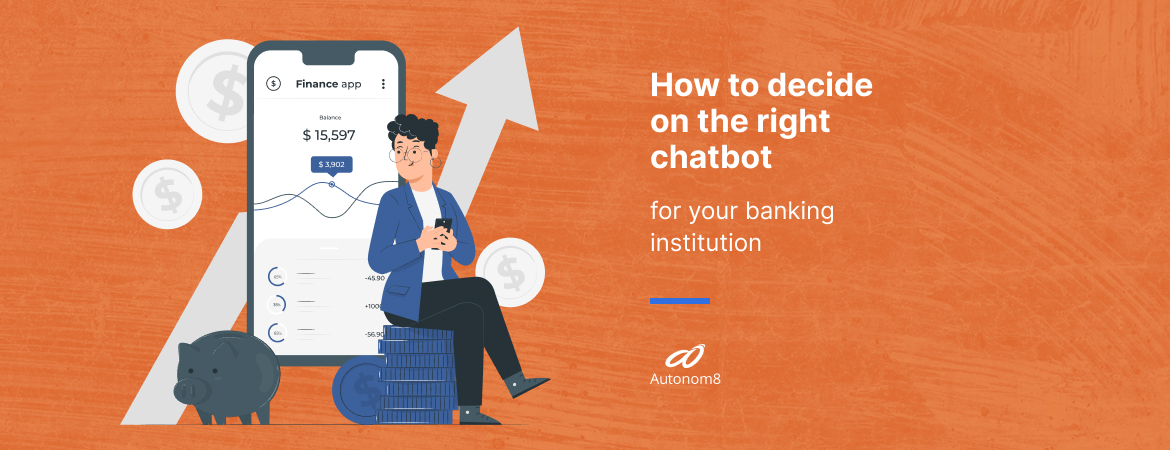How to decide on the right chatbot for your banking institution

Upcoming Webinar How Banks & Insurers can scale AI transformation with agentic workflows - Wed, May 14, 2025, 11:00 AM ISTRegister Now

The COVID-19 crisis has been tough on the US banking sector. As the pandemic dominated its spread across the nation in March, call centers for US-based banks collectively saw a substantial increase, with the larger US banks getting a 40% increase in call volume. These call volumes, coupled with longer wait times, have led US banks to rely heavily on their digital channels. Most banking institutions responded by diverting a substantial portion of their customers to conversational chatbots on their platform, notably Bank of America (Erica) and Capital One (Eno), to solve basic banking queries.
However, this is a stop-gap solution to the current pressing needs of banking customers. Most banks are still keeping their branches closed, which means customer support teams have to bear all the incoming support load. Banks hence need to step up their technology prowess to address complex customer queries by using AI and machine learning while ensuring customer value. Banks have looked at integrating cloud-based conversational solutions to get ahead of this situation in recent years. However, the pandemic has compelled the C-suite to look at customer support from a holistic perspective.
Selecting a conversational chatbot platform to integrate into existing banking systems is a persistent nightmare. The compliance, security, and privacy considerations involved can complicate the C-level decision-making process. The guidelines listed below can simplify the process of selection and guide the C-suite into making an informed decision on what an effective conversational AI-driven chatbot platform for their needs should be.
Hyperautomation is revolutionizing the banking industry by combining artificial intelligence, machine learning, and automation technologies to streamline operations and enhance customer experiences. By adopting hyperautomation, banks can automate repetitive tasks, improve operational efficiency, and deliver personalized customer interactions.

Conversational platforms, homegrown or procured, have traditionally been a function of the channel – web, mobile or social. Most chatbots for customer care are deployed within an app or website, which compels banking customers to navigate to that channel to get the queries addressed. However, with hyperautomation, banks can extend their conversational chatbots to widely available messaging or social platforms like WhatsApp or Facebook Messenger, meeting customers where they are and providing seamless support across multiple channels.
If the platform supports multi-channel integration, it should carry over context seamlessly across channels. A customer can start talking about a fee dispute on their desktop web browser, start traveling, and then chat with banking support over WhatsApp on-the-go. The chatbot platform needs to be able to resume the conversation seamlessly, without losing context. Hyperautomation enables context retention, ensuring a seamless customer experience regardless of the channel they use.
Related article: Increase Banking CSAT with Conversational AI Chatbots in 2023
Most conversational chatbot platforms integrate into existing CRM and banking systems and can surface only pertinent information about support queries in a rule-based fashion. However, with hyperautomation, banks can go beyond basic rule-based interactions. The chatbot platform can intelligently integrate into the end-to-end customer journey by holding the context of the entire triaging process in the conversation. Essential milestones in resolution can be transparently made visible in the chat conversation, providing customers with real-time updates and fostering trust and engagement in the issue resolution process.
Care agent teams are already bearing the immense load of the call volume in the current crisis. With hyperautomation, the chatbot platform can act as an intelligent concierge to the care agent team. By leveraging AI and machine learning, the platform can learn from past successful resolutions handled by human agents. The chatbot can be trained to solve similar issues at scale across multiple conversations, reducing subsequent call deflections to human care agent teams and alleviating their workload. Additionally, the platform should enable seamless communication between care agents and the chatbot, creating a collaborative environment and allowing the care agent team to focus on more complex issues.
These guidelines, combined with the power of hyperautomation, should assist executive decision-making for any banking institution, regardless of size and customer market. As banks try to adjust to a post-pandemic world, a well-chosen conversational chatbot platform empowered by hyperautomation would become their crucial business enabler to providing a white-glove customer experience.
Did you find these guidelines helpful? If you are looking for a platform providing all these capabilities, Autonom8 provides the only conversational chatbot platform your bank will ever need – A8Chat.
Are you interested in learning more? Schedule a demo and experience A8Chat today.
Fill in your details and our executive will get in touch within 48 hours
Fill in your details and our executive will get in touch within 48 hours